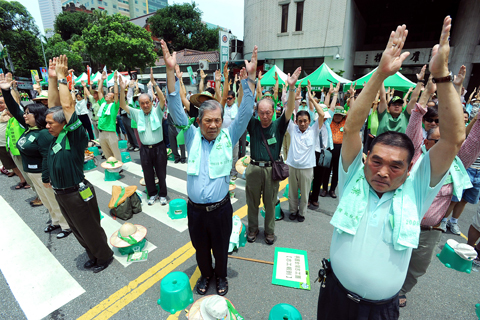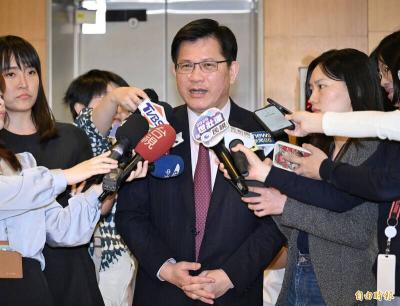President Ma Ying-jeou (馬英九) yesterday defended his administration’s plan to sign an economic cooperation framework agreement (ECFA) with China as part of a global trend in which Asian countries are rushing to sign bilateral trade agreements.
“Bilateral trade negotiations have become a global trend, as it is difficult to reach consensus in multilateral trade negotiations … Our major trade competitors signed many bilateral trade pacts and they would be competing with Taiwan unfairly if we didn’t sign an ECFA,” Ma said as he traveled to Kaohsiung County to promote an ECFA to a group of residents.
Countries are seeking to sign bilateral trade pacts, including free-trade agreements (FTA), he said. In Asia, South Korea has signed seven FTAs, China nine, Japan 11 and Singapore 14. Taiwan and North Korea are the only countries that are not signing FTAs, Ma said.

PHOTO: WANG YI-SUNG, TAIPEI TIMES
“An ECFA will attract more foreign investors to Taiwan and create jobs … People should not worry about losing their job after an ECFA is signed,” he said.
Meanwhile, the Mainland Affairs Council (MAC) yesterday dismissed accusations from a group of Taiwanese Americans that there has been a lack of oversight on an ECFA and said the cross-strait pact, which the Ma administration hopes to sign next month, would be sent to the Legislative Yuan for approval.
MAC Deputy Minister Liu Te-shun (劉德勳) said that as a democracy, Taiwan has a sound oversight mechanism through the legislature and that government bodies accept monitoring by the legislature.
Liu said the government had put a lot of effort into making the signing of an ECFA as transparent as possible, including reporting the process to the Legislative Yuan and explaining it to the public.
“An ECFA is a simple cross-strait economic exchange with no sovereignty and political issues involved. The government will send the pact to the legislature for approval before implementation,” he said.
A group of Taiwanese Americans has sent a joint statement to US President Barack Obama calling on him to urge the Taiwanese government to conduct a referendum on an ECFA and released a letter from 28 major US supporters of Taiwan to Legislative Speaker Wang Jin-pyng (王金平) asking him to make a critical review of the proposed agreement.
The statement to Obama, backed by 16 oinfluential Taiwanese-American organizations, also asks the president to negotiate an FTA with Taiwan.
In their letter to Wang, the supporters of Taiwan — including former chairman of the American Institute in Taiwan Nat Bellocchi and former deputy assistant to the vice president for National Security Affairs Stephen Yates — said they were concerned by the lack of transparency and legislative checks and balances in ECFA negotiations.

Taiwan would welcome the return of Honduras as a diplomatic ally if its next president decides to make such a move, Minister of Foreign Affairs Lin Chia-lung (林佳龍) said yesterday. “Of course, we would welcome Honduras if they want to restore diplomatic ties with Taiwan after their elections,” Lin said at a meeting of the legislature’s Foreign Affairs and National Defense Committee, when asked to comment on statements made by two of the three Honduran presidential candidates during the presidential campaign in the Central American country. Taiwan is paying close attention to the region as a whole in the wake of a

Chinese Nationalist Party (KMT) Chairman Eric Chu (朱立倫), spokeswoman Yang Chih-yu (楊智伃) and Legislator Hsieh Lung-chieh (謝龍介) would be summoned by police for questioning for leading an illegal assembly on Thursday evening last week, Minister of the Interior Liu Shyh-fang (劉世芳) said today. The three KMT officials led an assembly outside the Taipei City Prosecutors’ Office, a restricted area where public assembly is not allowed, protesting the questioning of several KMT staff and searches of KMT headquarters and offices in a recall petition forgery case. Chu, Yang and Hsieh are all suspected of contravening the Assembly and Parade Act (集會遊行法) by holding

President William Lai (賴清德) has appointed former vice president Chen Chien-jen (陳建仁) to attend the late Pope Francis’ funeral at the Vatican City on Saturday on his behalf, the Ministry of Foreign Affairs said today. The Holy See announced Francis’ funeral would take place on Saturday at 10am in St Peter’s Square. The ministry expressed condolences over Francis’ passing and said that Chen would represent Taiwan at the funeral and offer condolences in person. Taiwan and the Vatican have a long-standing and close diplomatic relationship, the ministry said. Both sides agreed to have Chen represent Taiwan at the funeral, given his Catholic identity and

Taiwan would welcome the return of Honduras as a diplomatic ally if the next president of that country decides to make such a move, Minister of Foreign Affairs Lin Chia-lung (林佳龍) said today. “We would welcome Honduras if they want to restore diplomatic ties with Taiwan after their elections,” Lin said during a legislative hearing. At the same time, Taiwan is paying close attention to the Central American region as a whole, in the wake of a visit there earlier this year by US Secretary of State Marco Rubio, Lin said. Rubio visited Panama, El Salvador, Costa Rica and Guatemala, during which he